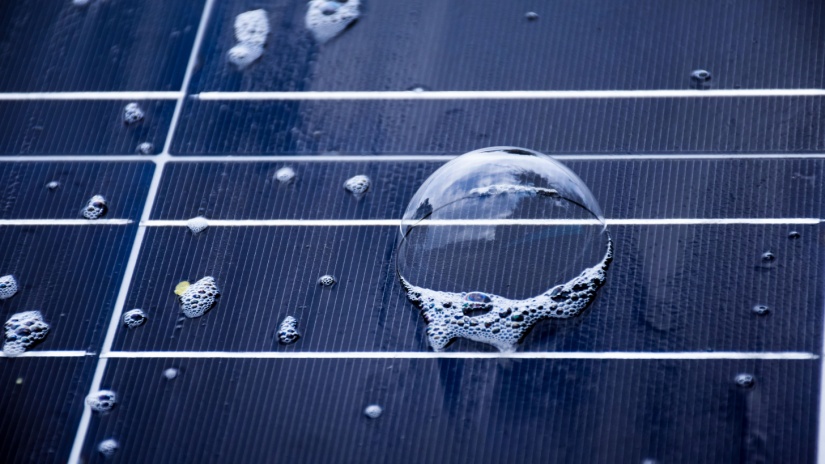Knowledge Centre
Do you need to clean your solar panels?

Australia is a global leader in solar power adoption, with more than 3.6 million solar PV systems installed across the country.
With the sun generously shining on us year-round, it’s no surprise that solar panels have become a popular choice for homes and businesses alike. But once those panels are installed, the question arises: do you need to clean your solar panels?
The short answer is yes; but not always, and not for everyone.
Cleaning solar panels can help ensure they’re working at peak efficiency, but how often and how thoroughly this needs to be done depends on several factors. Let’s dive into the ins and outs of solar panel maintenance in Australia.
Do you have to clean your solar panels?
Technically, solar panels are low-maintenance, but that doesn’t mean they’re maintenance-free. While rain does help to wash away some of the surface dirt and dust, it’s often not enough to keep panels completely clean, especially in drier or dustier regions.
So, do you have to clean them?
Not always - but if your panels are noticeably dirty or underperforming, a clean might make a significant difference.
Why should you be cleaning solar panels?
Even a thin layer of grime can reduce the amount of sunlight hitting the solar cells, which in turn reduces energy output. Here’s a breakdown of why regular cleaning can be beneficial:
Maximise efficiency
Dust, bird droppings, leaves, and other debris can block sunlight, leading to a drop in panel performance. Studies show that dirty panels can lose up to 20% of their efficiency.
Prolong system life
Regular maintenance, including cleaning, can help your panels last longer and operate more effectively over the years.
Avoid build-up of permanent damage
In coastal or industrial areas, salt spray and pollutants can leave residues that, if left untreated, may corrode the panels over time.
Monitor system health
Cleaning gives you a chance to inspect your system and spot issues like micro-cracks, loose wiring or animal nests.
Improve ROI
The better your panels perform, the faster you'll pay off your system through energy savings. Keeping them clean helps protect your investment.
DIY solar panel cleaning vs calling the professionals
DIY cleaning
You can clean solar panels yourself with a soft brush, mild detergent and plenty of water - just like washing a car. However, access, safety and system warranty terms should be taken into account.
Pros
- Cost-effective
- Easy for single-storey homes
- Immediate results
Cons
- Safety risks, especially on rooftops
- Possible damage to panels if incorrect materials are used
- Might void warranty if not done correctly
Professional cleaning
Solar panel cleaning companies are equipped to handle the job safely and efficiently, often using specialised tools and deionised water systems.
Pros
- Safer, especially for multi-storey homes
- Thorough and expert cleaning
- Can include an inspection report
Cons
- Additional cost
- Might need to book in advance
When should solar panels be cleaned?
There's no one-size-fits-all answer, but most experts recommend a clean every 6 to 12 months. A good rule of thumb is to check them at the end of the dry season or after heavy storm activity.
You should especially consider cleaning if:
- Your area has experienced heavy bushfire smoke or dust storms
- You notice a sudden drop in system output
- You see visible build-up from the ground
Areas that require solar panel cleaning more frequently
Some regions in Australia experience conditions that accelerate solar panel grime. These include:
- Outback and regional areas: Dry and dusty environments
- Coastal zones: Salt spray and seagull droppings
- Urban and industrial zones: Air pollution and smog residue
- Tropical areas: Leaf litter and mould from humidity
- Bushfire-prone regions: Ash and soot accumulation
How to keep your solar panels efficient
Besides cleaning, there are other steps you can take to keep your solar panels performing their best:
- Monitor your inverter: Any red lights or fault codes indicate performance issues
- Check your energy production regularly: A noticeable drop may point to dirt build-up or system faults
- Schedule an annual inspection: Especially useful for older systems or those in high-risk areas
- Trim overhanging branches: Prevents shade and reduces leaf litter
Safety tips for cleaning your own solar panels
If you're considering the DIY route, safety must be your top priority. Here are some practical tips to follow:
Common sense safety tips
- Never walk on the panels: They can be slippery and fragile
- Turn off the system before cleaning
- Avoid cleaning in the heat of the day: Cool water on hot panels can cause thermal shock
- Use a stable ladder and harness if working at height
- Avoid harsh chemicals or abrasive brushes: These can damage the panel surface
- Work with a buddy: Always safer to have someone assist or spot you
Benefits of choosing solar panels
Still considering switching to solar? The benefits go well beyond lower electricity bills:
- Reduce your carbon footprint
- Gain independence from the grid
- Increase your property value
- Access government rebates and feed-in tariffs
- Future-proof against rising energy prices
Whether you’re in sunny Queensland, breezy WA, or Melbourne’s leafy suburbs, solar panels can help power your home sustainably.
Ready to switch to solar?
Maintaining your solar panels is important - but finding the right solar plan is just as crucial.
Compare Energy makes it simple to find a solar provider that suits your home, location and energy needs. Whether you're looking to install a new system or switch to a better feed-in tariff, we help you compare options and save money on your power bill.
Call us today on 1300 790 106!

